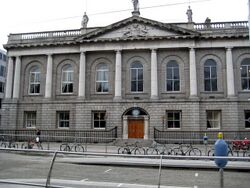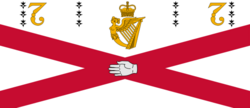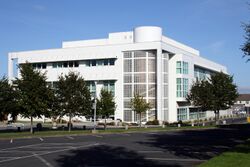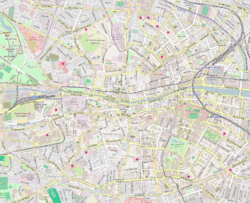Royal College of Surgeons in Ireland
Topic: Organization
 From HandWiki - Reading time: 12 min
From HandWiki - Reading time: 12 min
Coláiste Ríoga na Máinleá in Éirinn[2] | |
 | |
| Latin: Collegium Regium Chirurgorum Hiberniae[3] | |
| Motto | Consilio Manuque (Scholarship and Dexterity) |
|---|---|
| Type | Private |
| Established | 11 February 1784 |
| President | Professor Laura Viana[4] |
| Vice-Chancellor | Cathal Kelly[5] |
| Students | 4,094[6] (as of 2020) |
| Address | 123 St Stephen's Green , , D02 YN77 , Republic of Ireland [ ⚑ ] : 53°20′21″N 6°15′45″W / 53.33918°N 6.26257°W |
| Language | English |
| Affiliations | NUI |
| Website | rcsi |
 | |
The Royal College of Surgeons in Ireland (RCSI) is a not-for-profit medical professional and educational institution, which is also known as RCSI University of Medicine and Health Sciences. It was established in 1784 as the national body for the surgical branch of medicine in Ireland, with a role in supervision of training, and as of 2021 provides a broad range of medical education in multiple countries.[7]
RCSI's main campus is situated on St. Stephen's Green and York Street in central Dublin and incorporates schools of medicine, pharmacy, physiotherapy and nursing. It offers undergraduate and postgraduate education in a number of healthcare fields.[7]
The RCSI achieved Ireland's highest position in the Times Higher Education (THE) University Impact Rankings 2021, coming joint second in the world for ‘Good Health and Wellbeing’ from a total of 871 institutions.[8] THE University Impact Rankings recognise universities around the world for their social and economic impact based on the United Nations' 17 Sustainable Development Goals (SDGs).
History
Background and foundation
Since medieval times, the practice of surgery in Dublin was licensed by one of the Guilds of the City of Dublin, the Barber-Surgeons' Guild, also known at times as the Guild of St. Mary Magdalene. The guild chapel was in Christchurch. Guild membership was obtained by a 3-year apprenticeship, followed by 2 years as a journeyman. In fact the College of Surgeons maintained a mandatory period of apprenticeship to become a qualified surgeon until 1828.[citation needed]
In 1446, the Barber-Surgeons' guild was incorporated by a royal decree of Henry VI, becoming the first medical corporation in Britain or Ireland.
In 1765 Sylvester O'Halloran, a surgeon from Limerick, proposed a College of Surgeons along the lines of the College de St. Cosme in Paris, which had been regulating French surgeons since it had been created by Royal Charter by Louis IX in 1255, to train and regulate surgeons.[9] The Dublin Society of Surgeons was founded in 1780 at the Elephant public house on Essex Street (now Parliament Street).
Trinity did not teach surgery as a subject until 1851, so Ireland was entirely without a school focused on surgery. To have a separate organization focused on providing standardised surgical education became one of the goals of the society and they lobbied for a Royal Charter, in 1781 presenting the Lord Lieutenant a petition to be incorporated separately from the barbers. The awaited charter was granted by King George III on 11 February 1784. The governing body, including the first President, Samuel Croker-King, and William Dease, first professor of surgery, met in the boardroom of the Rotunda Hospital for the first time on 2 March.
Non-discrimination
Admission or employment was not subject to discrimination on sectarian grounds. Two of the RCSI's leading founders, Sylvester O'Halloran and William Dease, as well as 11 of its first 57 presidents, were Catholics. The college also recognized the medical qualifications given by the Catholic University from 1856, which gave legitimacy to their diplomas.
18th and 19th centuries
The first candidate for examination was John Birch, in August 1784.

The RCSI's first location, at the corner of York Street, was acquired in September 1805, with additional land at Glover's Alley bought in 1809. The site was previously an abandoned Quaker burial ground. The Duke of Bedford laid the first stone of the new building on St. Patrick's Day, 1806 and building reached completion in March 1810. As of 2021, this remains the primary location of the institution.
A supplemental charter was granted by Queen Victoria in 1844, dividing medical graduates into Licentiates and Fellows. Initially, physicians were trained alongside surgeons. In 1886 these two disciplines were merged, and the medical school began operation. As a result of this historical legacy, graduates of medicine still receive Licentiate diplomas from the two Royal Colleges as well as now being awarded MB (Bachelor of Medicine) BCh (Bachelor of Surgery) and BAO (Bachelor of the Art of Obstetrics) degrees by the National University of Ireland.
Now defunct subjects formerly taught include: Logic (1852–1862), Military Surgery (1851–1860) and botany (1792–1889).
20th century
During the 1916 Rising, the main college building on St Stephen's Green was occupied by Irish Citizen Army forces, led by Commandant Michael Mallin and Countess Markievicz. After surrendering, both were tried and sentenced to death. Mallin was executed while Markievicz's sentence was commuted due to her gender.
The subject Hygiene or Political Medicine (1841–1921) was retired, and its Chair united with Medical Jurisprudence.
The RCSI became the first medical institution of learning to offer a 4-year graduate entry programme for medicine in Ireland.[citation needed]
Ethna Gaffney became the first female professor at RCSI in 1967.[10]
21st century
During the period 2014 – 2018, RCSI-affiliated researchers collaborated with over 2,100 international academic and industry institutions producing over 2,900 co-authored publications. The university's field-weighted citation impact is twice the world average and scores in the top decile internationally in the Times Higher Education World University Ranking (2020).[7]
In December 2019, the RCSI was authorised as a university, becoming the ninth in Ireland, following a change in legislation, and an application by the college. The long-sought change in status was complicated by the RCSI's status as a private body but eventually a standard process was created and the college met the conditions set out in it, and following ministerial approval, the change was endorsed by votes in both houses of the Oireachtas.[1] This also made it the eleventh university on the island of Ireland, including The Queen's University of Belfast and Ulster University.
Associated hospitals
Since the 1980s Beaumont Hospital, Dublin has been the principal centre for medical training. Other affiliated hospitals include teaching hospitals such as Connolly Hospital, Royal Victoria Eye and Ear Hospital, St. Joseph's Hospital, Dublin and University Hospital Waterford.
Academic structure
The institution has a structure of Faculties and Schools, some parts of which focus more on undergraduate studies, some more on post-graduate and continuing professional education.[11]
The lead faculty is the Faculty of Medicine and Health Sciences, with Schools as follows:
- School of Medicine (largest medical school in Ireland; 5- or 6-year undergraduate programme, 4-year Graduate Entry Programme (GEM))
- Schools of Pharmacy and Biomolecular Sciences (undergraduate, including MPharm, and post-graduate, education)
- School of Physiotherapy (undergraduate and graduate-entry, and post-graduate, education)
- School of Nursing & Midwifery (largest post-graduate nursing education provider in Ireland)
- School of Postgraduate Studies (three Masters streams, MD and PhD studies)
and two other units:
- Institute of Leadership
- Centre for Positive Psychology and Health
The other faculties are:
- Faculty of Radiologists (catering to radiologists and radiation oncologists)
- Faculty of Dentistry
- Faculty of Nursing and Midwifery
- Faculty of Sports and Exercise Medicine, operated jointly with the Royal College of Physicians of Ireland
Education is delivered using a structure of departments working across faculties and schools.[11]
Research and innovation
RCSI is home to numerous healthcare research collaborations and centres. The university's research is focused on improving human health through "translational" research: clinical, laboratory-based and health service research informed by societal and global health challenges, and on improved diagnostics, therapeutics and devices; healthcare delivery issues; policy and clinical practice and enhancement of the quality of education of healthcare professionals.
Strategic research themes include:
- Biomaterials and regenerative medicine
- Cancer
- Neurological and psychiatric disorders
- Population health
- Health service issues
- Surgical science and practice
- Vascular biology
Admissions and values
RCSI is a culturally diverse, international organisation with alumni presence in almost every country in the world. More than 3,800 students representing 60 nations are typically enrolled in its Medicine (1,800), Pharmacy (200) and Physiotherapy (100) programmes. RCSI claims to have educated more than 26,000 alumni.[12]
It states that it values innovation, excellence, independence, academic freedom, diversity, tolerance and community and that it champions a patient-centric approach to its activities and endeavours. RCSI is the largest Irish medical school.[citation needed]
Student life
The Students' Union (SU) is an annually elected body, consisting of 8 officers. The SU is the institution's bridge between faculty and the student body and is invited to most meetings, ensuring that student voices are heard on a variety of topics. The SU works closely with the Student Council, which consists of class representatives from all classes at RCSI.
Students at RCSI are encouraged to participate in extracurricular activities that promote service in the community and cultural awareness. 80% of the student population is from outside the European Union, with a significant portion coming from North America, the Middle East and Asia.[13] The Biological Society (BioSoc) is the official student society of the Royal College of Surgeons in Ireland (RCSI) and claims to be the oldest student medical society in the world.[citation needed] The RCSI International Night and the Chocolate Ball (amongst many others) are their main annual events.
RCSI has a sports ground in Dardistown in Dublin's northern suburbs.[citation needed]
International aspects and operations
The RCSI is active in medically related sectors of education in multiple locations. During the South African Apartheid, for example, the RCSI provided medical education to those that were discriminated against.[14] More than 60 countries from each continent are represented in the RCSI student body.[citation needed]
In Malaysia the RCSI & UCD Malaysia Campus, became the RCSI's "launching pad" in South-East Asia. Established in 1995, medical students may choose to complete their pre-clinical studies at either UCD or RCSI in Dublin, before continuing the clinical aspect of their degree in Penang. Also in Malaysia, Perdana University Royal College of Surgeon in Ireland (PU-RCSI) was established in 2011, aiming to host up to 100 students per year on its 5-year undergraduate medical programme, the first cohort to graduate in 2016.[citation needed]
RCSI-Bahrain is a fully-owned constituent university of the RCSI, the first cohort of its students commencing medical studies in October 2004. Graduates are entitled to a Degree of Bachelor of Medicine, NUI, Bachelor of Surgery, Bachelor of Obstetrics MB, BCh, BAO (NUI, RCSI) degrees. In 2006, the Medical University of Bahrain established a new School of Nursing which took its first cohort of students in September 2006. Since 2009, students can also obtain the degrees conferred upon RCSI graduates from the National University of Ireland.[citation needed]
In 2005, RCSI Dubai was founded and currently offers a master's programme in Healthcare Management. In 2007, the RCSI, in conjunction with Valentia Technologies, the Dublin Fire Brigade (DFB), and Ireland's Pre Hospital Emergency Care Council (PHECC), launched a unique training initiative with the Emergency Medical Services Dubai Training Institute. The aim is to better patient care and improve response times within Dubai's emergency ambulance services.[15]
For students at the home institution of the RCSI, options may be taken abroad as a result of collaborative agreements with other medical schools around the world. In 2007, these medical schools included Columbia University, University of Pennsylvania, and Tufts University. There are also informal agreements with other institutions such as the Johns Hopkins University and Mayo Clinic.[citation needed]
Motto and colours
The RCSI motto, "Consilio Manuque", was adopted from that of the College de St. Cosme in Paris, which had been afforded the motto by Louis XIV. It was originally "Consiloque Manuque", his personal motto.
Notable alumni
- Professor Abraham Colles of Anatomy, the first person to characterise the injury that was later on known as Colles' fracture
- Felipe Contepomi, former Argentina rugby union international.
- Surgeon Captain Thomas Joseph Crean VC DSO (1873 to 1923), who later achieved the rank of Major.
- Baron Darzi of Denham, Professor of Surgery, Imperial College London, and formerly the British Parliamentary Under-Secretary of State for Health
- Sir Alexander Dempsey, M.D. FRSM, JP, physician, hospital administrator and magistrate.
- Emily Winifred Dickson (13 July 1866 – 1944), the first woman Fellow of any Royal College of Surgeons in Ireland or Great Britain
- Patrick Dignan, major general, director of army surgery, British Army, between 1973 and 1978.
- Sir Ian Fraser (1901-1999), president of the college and president of the British Medical Association, who introduced the widespread use of penicillin into military hospitals during the Second World War
- Nada Haffadh, Bahrain's first female minister when she was appointed Minister of Health in 2004
- Ravi Kant, professor of surgery, Padma Shri award winner(2016) and vice chancellor of King George's Medical University, Lucknow, India.
- Karl Mullen, Irish Rugby Union player and captain of the Grand Slam-winning Irish team in 1948
- Pat O'Callaghan, Irish gold medallist at both the 1928 and 1932 Olympic Games
- Ian Robertson, former star of the Dublin gaelic football team
- Sir William Stokes, knighted for his contribution in the field of surgery.
- Wan Azizah Wan Ismail, first Malaysian to be awarded the MacNaughton-Jones gold medal for Obstetrics and Gynecology in 1977; a MP, the first president of the Malaysian People's Justice Party, the first female Malaysia's Deputy Prime Minister and wife to current Malaysia's 10th prime minister, Anwar Ibrahim.
- Sir William Wilde, surgeon, author and father of Oscar Wilde
- T.G. Wilson, President of the RCSI (1958–61), author, founder of the Journal of the College (1963)
Notable honorary fellows
- Robert Adair (1784)[16]
- Benjamin Bell (1784)
- Percivall Pott (1788, posthumous)
- John Hunter (1790)
- John Abernethy, Astley Cooper, Antonio Scarpa, Samuel Thomas von Sömmerring (1821)
- Georges Cuvier (1831)
- Friedrich Tiedemann (1836)
- Benjamin Collins Brodie (1838)
- Richard Owen (1849)
- William Bowman (1867)
- Samuel Haughton (1873)
- Hermann von Helmholtz (1881)
- Louis Pasteur, Joseph Lister, Thomas Henry Huxley, James Paget, Thomas Spencer Wells (1886)
- John Eric Erichsen, Jonathan Hutchinson (1887)
- Thomas Heazle Parke (1889)
- John Shaw Billings, Hermann Snellen (1892)
- Thomas Joseph Crean (1902)
- Anthony Traill (1905)
- Henri Hartmann, Alfred Henry Keogh, Almoth Edward Wright (1906)
- William Macewen (1912)
- Berkley Moynihan (1913)
- Harvey Cushing (1918)
- Arthur William Patrick Albert (1919)
- William Mayo and Charles Mayo, William Williams Keen (1921)
- Alfred Webb-Johnson (1948)
- Cecil Pembrey Grey (1954)
- Seán T. O'Kelly (1958)
- Benjamin Guinness (1961)
- Éamon de Valera, Arthur Porritt (1964)
- Michael Ellis De Bakey (1967)
- Bryan Guinness, Walter Mackenzie (1968)
- Denis Parsons Burkitt, Francis Daniels Moore (1973)
- Cearbhall O'Dalaigh (1975)
- J. Hartwell Harrison, M.D. (1976)
- Patrick Hillery (1977)
- Robert B. Salter (1978)
- John W. Kirklin (1979)
- Daoud Hanania (1980)
- Abdullah bin Abdulaziz Al Saud (1988)
- Sultan Azlan Shah of Perak (1991)
- Mahathir Mohamad (1991), Prime Minister of Malaysia
- Mary Robinson (1994), former President of Ireland
- Emir Shaikh Isa bin Sulman Al Khalifa (1995)
- Mother Teresa of Calcutta (1995)
- Nelson Mandela (1996)
- Alfred Cuschieri (1996), professor
- Seamus Heaney (1998)
- Mary McAleese (1998), former President of Ireland
- Sultan Azlan Shah The Yang Di Pertuan Agong IX (2000)
- Sheikh Maktoum bin Rashid Al Maktoum (2004)
- Bertie Ahern (2006), former Taoiseach
- Bob Geldof (2007)
- Jimmy Carter (2007), former US President
Honorary degrees
The RCSI was granted independent degree-awarding status by the Irish government in 2010, which also allowed the then college, now university, to award honorary degrees. Among others, the following individuals have received honorary doctorates from the RCSI.
- 2011: Mary McAleese, President of Ireland (1997–2011)[17]
- 2013: The Baron Darzi of Denham, FRCSI, surgeon and former British health minister[18]
- 2014: Abraham Verghese - Doctor of Science, professor at Stanford University School of Medicine[19]
- 2016: Nezam H. Afdhal, Chief of Hepatology and Director of the Liver Center, Beth Israel Deaconess Medical Centre, Boston and Professor of Medicine, Harvard Medical School; RCSI Class of 1981[20]
- 2017: Bennet Omalu, forensic pathologist/neuropathologist, Chief Medical Examiner for San Joaquin County, California, and Clinical Professor of Medical Pathology and Laboratory Medicine, University of California at Davis[21]
- 2018: Barbara Murphy, Murray M. Rosenberg Professor of Medicine, Dean for Clinical Integration and Population Health, Icahn School of Medicine at Mount Sinai, New York; RCSI Class of 1989[22]
- 2018: Siddhartha Mukherjee, Associate Professor of Medicine, Columbia University Medical Centre, New York[23]
- 2019: Sally Davies, Chief Medical Officer for England and Chief Medical Advisor to the UK Government Department of Health and Social Care; professor[citation needed]
- 2019: Garret A. FitzGerald, physician and professor at the Perelman School of Medicine of the University of Pennsylvania[24]
- 2020: Richard Horton, Editor-in-Chief and Publisher of The Lancet[25]
- 2021: Martin Seligman, Zellerbach Family Professor of Psychology and Director of the Positive Psychology Center at the University of Pennsylvania; founder of Positive Psychology as a field of scientific study[26]
Arms
|
See also
- Faculty of Dentistry of the Royal College of Surgeons in Ireland
- Irish College of Ophthalmologists
- Perdana University Royal College of Surgeons in Ireland
- Royal College of Surgeons of England
References
- ↑ 1.0 1.1 O'Brien, Carl (10 December 2019). "Royal College of Surgeons becomes State's ninth university". The Irish Times. https://www.irishtimes.com/news/education/royal-college-of-surgeons-becomes-state-s-ninth-university-1.4111146. "The Royal College of Surgeons Ireland (RCSI) has been formally authorised to use the title of “university” for the first time in 235 years. ... It follows an amendment to the Qualifications and Quality Assurance (Education and Training) (Amendment) Act 2019, which provides a new legislative route for private education providers to apply for university designation. ... It now becomes the ninth university in the State"
- ↑ "Royal College of Surgeons in Ireland (home page)". http://www.rcsi.com/.
- ↑ "RCSI Medal Collection". http://webcache.googleusercontent.com/search?q=cache:EM5rQnhTNN4J:heritage.rcsi.ie/CalmView/Record.aspx?src%3DCalmView.Catalog%26id%3DRCSI%252FMedals%252F44&hl=en&gl=ie&strip=1&vwsrc=0.
- ↑ "RCSI Council (2022-2024)". https://www.rcsi.com/about/rcsi-council/.
- ↑ "RCSI Senior Management Team". https://www.rcsi.com/about/senior-management-team.
- ↑ "Annual reports". https://www.rcsi.com/about/publications/annual-reports.
- ↑ 7.0 7.1 7.2 "RCSI University of Medicine and Health Sciences". 20 January 2021. https://www.timeshighereducation.com/world-university-rankings/rcsi-university-medicine-and-health-sciences.
- ↑ "Impact Rankings: Good health and well-being". 16 April 2021. https://www.timeshighereducation.com/rankings/impact/2021/good-health-and-well-being.
- ↑ The Proposals for the Advancement of Surgery in Ireland
- ↑ Finn, Clodagh (2024-01-14). "Clodagh Finn: Ethna Gaffney was an academic trailblazer who introduced first dietetics course" (in en). https://www.irishexaminer.com/opinion/columnists/arid-41307472.html.
- ↑ 11.0 11.1 "About us - Faculties". https://www.rcsi.com/dublin/about.
- ↑ "Collaborative education". RCSI. https://www.rcsi.com/about/international/collaborative-education.
- ↑ "Clubs & Societies". rcsi.ie. http://www.rcsi.ie/clubs_societies.
- ↑ "Impact: Tackling discrimination starts with education – setting up an anti-racist reading group". rcsi.ie. https://www.rcsi.com/impact/details/2021/06/setting-up-an-anti-racist-reading-group.
- ↑ "An Taoiseach launches RCSI lead partnership with Dubai emergency medical services". 18 January 2007. https://www.rcsi.com/dublin/news-and-events/news/news-article/2007/01/an-taoiseach-launches-rcsi-lead-partnership-with-dubai-emergency-medical-services.
- ↑ "Honorary Fellows". Royal College of Surgeons in Ireland. https://www.rcsi.com/dublin/library/collections/heritage-collections/honorary-fellows.
- ↑ Hyl, Aine (22 November 2016). "My education week: Board meetings, Facetime with my grandchildren and an honorary doctorate". The Irish Times. https://www.irishtimes.com/news/education/my-education-week-board-meetings-facetime-with-my-grandchildren-and-an-honorary-doctorate-1.2870110.
- ↑ Culliton, Gary (27 January 2016). "Lord Darzi receives UK's Order of Merit". Irish Medical Times. https://www.imt.ie/news/lord-darzi-receives-uks-order-of-merit-27-01-2016/.
- ↑ "RCSI June Conferring 2014 - Professor Abraham Verghese receives Honorary Doctorate". https://www.youtube.com/watch?v=rUI6PlwS0LU.
- ↑ Mudiwa, Lloyd (24 June 2016). "HCV: On the road to global elimination". Irish Medical Times. https://www.imt.ie/clinical/hcv-on-the-road-to-global-elimination-24-06-2016/.
- ↑ "Dr Bennett Omalu, campaigner against football-related brain injuries, is honoured". 12 June 2017. https://www.eurotimes.org/dr-bennett-omalu-campaigner-football-related-brain-injuries-honoured/.
- ↑ "Barbara Murphy, MD, Honored by Her Alma Mater in Ireland". 16 July 2018. https://health.mountsinai.org/blog/barbara-murphy-md-honored-by-her-alma-mater-in-ireland/.
- ↑ "Conferring of NUI degrees in RCSI, Dublin - May 2018". 31 May 2018. http://www.nui.ie/news/2018/RCSI_Conferring.asp.
- ↑ RCSI celebrates graduates at summer conferring ceremonies - website of the Royal College of Surgeons in Ireland
- ↑ "Postgraduate Academic Awards Ceremony 2020". RCSI. https://www.youtube.com/watch?v=dvN_VkeHYQw.
- ↑ Jackson, Aoife (28 May 2021). "Founder of Positive Psychology Martin Seligman awarded RCSI Honorary Doctorate". Hospital Professional (Ireland). https://hospitalprofessionalnews.ie/2021/05/28/founder-of-positive-psychology-martin-seligman-awarded-rcsi-honorary-doctorate/.
- ↑ "Grants and Confirmations of Arms Vol. J". National Library of Ireland. 1898. p. 395. https://catalogue.nli.ie/Record/vtls000529301/StaffViewMARC#tabnav. Retrieved 31 December 2022.
External links
- RCSI Library collections
- e-publications@RCSI, the RCSI institutional repository
- RCSI Surgical Society
- RCSI Students' Union
- RCSI Student Medical Journal (RCSIsmj)
- Beaumont Hospital
- RCSI Dubai
- RCSI Medical University of Bahrain
- RCSI & UCD Malaysia Campus
 |
 KSF
KSF
